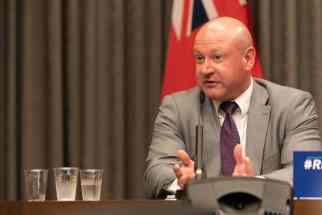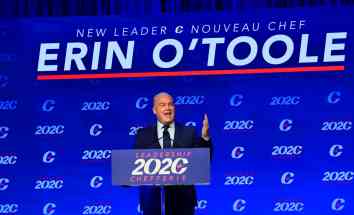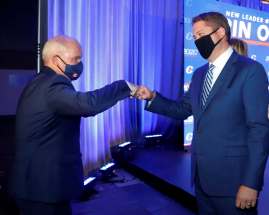O’Toole faces his party’s three-headed monster
Read this article for free:
or
Already have an account? Log in here »
To continue reading, please subscribe:
Monthly Digital Subscription
$0 for the first 4 weeks*
- Enjoy unlimited reading on winnipegfreepress.com
- Read the E-Edition, our digital replica newspaper
- Access News Break, our award-winning app
- Play interactive puzzles
*No charge for 4 weeks then price increases to the regular rate of $19.00 plus GST every four weeks. Offer available to new and qualified returning subscribers only. Cancel any time.
Monthly Digital Subscription
$4.75/week*
- Enjoy unlimited reading on winnipegfreepress.com
- Read the E-Edition, our digital replica newspaper
- Access News Break, our award-winning app
- Play interactive puzzles
*Billed as $19 plus GST every four weeks. Cancel any time.
To continue reading, please subscribe:
Add Free Press access to your Brandon Sun subscription for only an additional
$1 for the first 4 weeks*
*Your next subscription payment will increase by $1.00 and you will be charged $16.99 plus GST for four weeks. After four weeks, your payment will increase to $23.99 plus GST every four weeks.
Read unlimited articles for free today:
or
Already have an account? Log in here »
Hey there, time traveller!
This article was published 24/08/2020 (1938 days ago), so information in it may no longer be current.
A new personality with new opportunities but, in so many ways, freshly minted Conservative Leader Erin O’Toole faces the very same problems that humbled his predecessors.
The victor in a vote-counting process that unfolded Sunday night at a glacial pace, O’Toole has a lot going for him. He is forceful, experienced and he already holds a seat in the House of Commons. But beyond those obvious attributes, he has not yet demonstrated any plan to manage a party that has established itself as the three-headed monster of Canadian politics.
The first head represents the moderate centrist voters from coast to coast who are just begging for a moderate small “c” conservative leader and party that can provide a real alternative to Prime Minister Justin Trudeau’s Liberals. This head wants fiscally conservative, socially progressive policies. They want a leader who can march in a Pride parade and wage war on the budget deficit.
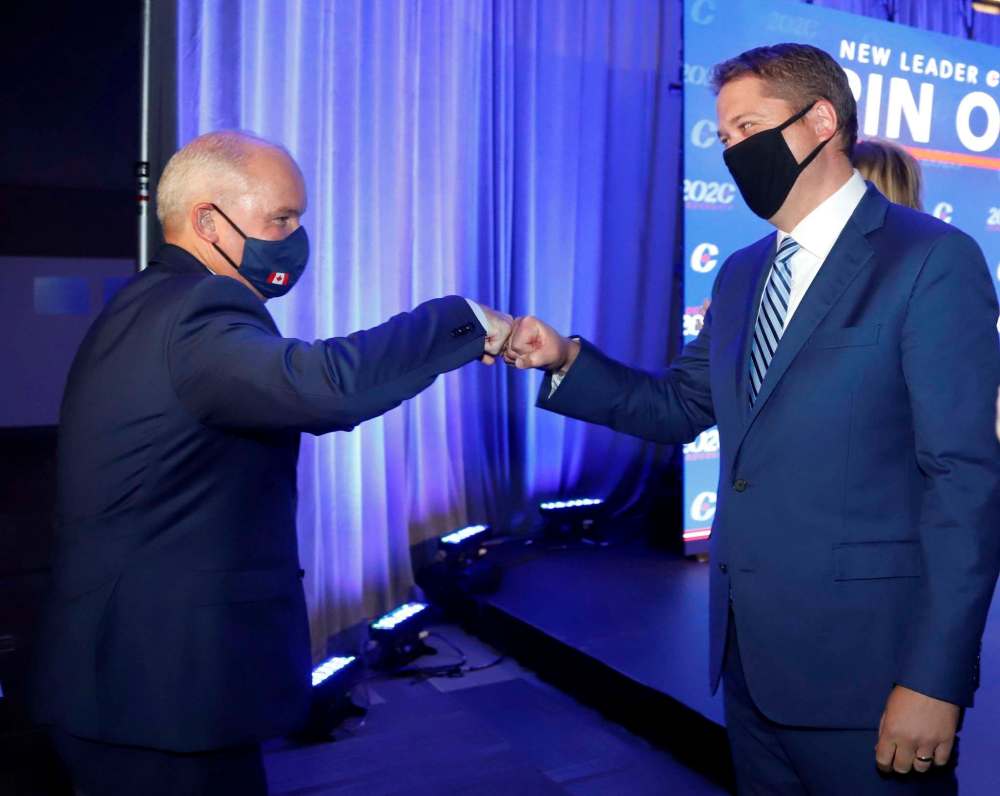
In the middle of the three-headed beast, you’ve got hardcore Western separatists who cannot be faulted for being a wee bit bewildered about the outcome of this leadership vote. How, these party Tory supporters are asking themselves, did a candidate from Ontario snatch the helm of a party that has been ruled by good-ol’ Western boys since it was founded just over 16 years ago?
If that isn’t a strange enough coupling, you must contend with the ravenous yaw of a third head: the small but impressive social conservative wing made up of party supporters that continue to have faith that O’Toole’s win is a chance to recast the Tories as a firmly anti-abortion, anti-same sex marriage, make-Canada-great-again juggernaut.
Rather than demonstrate a capacity to bridge these three distinct constituencies, O’Toole has only shown that he pandered just enough to all three constituencies to win the leadership.
O’Toole marketed himself as a mostly moderate option not unlike the challenger, Peter MacKay. He promised a more evolved policy on climate change and has implied he would do nothing to dial back rights for the LGBTQ* community. He has also promised to march in Pride parades as long as they do not exclude groups like police officers.
O’Toole worked hard to court Westerners, launching his leadership campaign in Calgary. Notwithstanding his promise to provide a climate change policy, he sold himself to Westerners as a champion of the oil patch ready to fight back against foreign-funded eco-activists trying to eradicate the oil economy.Put it all together and you have a new leader who is all over the political and ideological map. Just like the party he now leads.
Finally, he quietly courted social conservatives so that he was their choice on second and third ballots. Overall, he has said he does not support taking away any right already established by the courts but is less clear about what he would support within the social conservative agenda.
Put it all together and you have a new leader who is all over the political and ideological map. Just like the party he now leads.
Ever since the 2015 election and Prime Minister Stephen Harper’s inglorious self destruction, the Tories have struggled to find an identity that can both soothe the party’s volatile internal constituencies while offering enough value to open-minded swing voters.
O’Toole is clearly more confident and convincing than the affable but awkward Andrew Scheer, who simply could not navigate his way out of that space between the political rock and a hard place. When he was backed into intractable policy quandaries, Scheer managed to consistently miss the sweet spot.
To undecided voters, Scheer was too far right, particularly on social issues. His failure to figure out how to engage with Pride Day events, or have a simple discussion about gun control, made him a punching bag for the Liberals. Inside the party, he simply failed to manage the competing viewpoints and forge a common cause.
On the heels of the Scheer experience, O’Toole will have to prove to people inside and outside his party that he is better at finding a path to that common cause. And that is going to be a tough path if events that unfolded in parallel to the leadership convention are any indication.
The Wexit party announced this past weekend it would be ready to run candidates in Western provinces should there be a snap election this fall. The Tories hardly need to deal with yet another splinter party competing for support in their heartland.
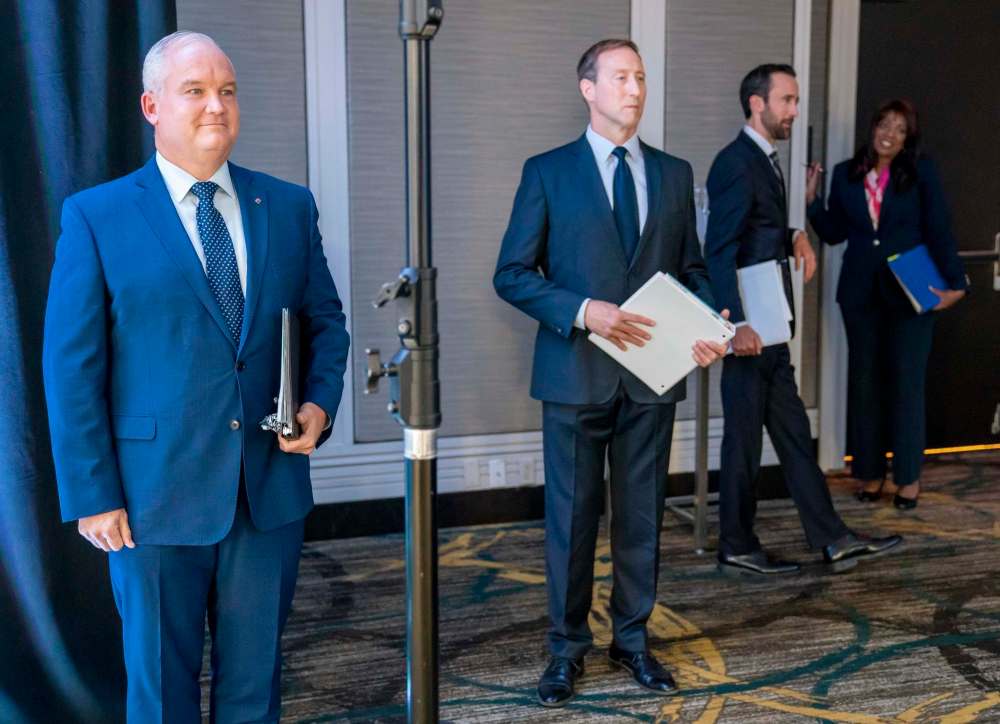
There’s one last problem facing O’Toole: he will have precious little time to forge a new brand and build support within the party before he must confront a wounded Liberal government and a confidence vote that will greet September’s Throne Speech.
A fall election is hardly a forgone conclusion. If he wants to topple the Trudeau government, he will have to reach some sort of agreement with the Bloc Quebecois and the NDP for all three parties to support a vote of non-confidence. That means the other opposition parties will be watching the new Tory leader’s performance and his policies to see if they want to be aligned with him on that important vote. There is no guarantee either party will want to join O’Toole if he lurches to the right.
If he wants to exceed Scheer’s performance and results, O’Toole is going to have to radically re-define Canadian conservatism in a fresh and innovative way. And the clock is already ticking.
dan.lett@freepress.mb.ca

Born and raised in and around Toronto, Dan Lett came to Winnipeg in 1986, less than a year out of journalism school with a lifelong dream to be a newspaper reporter.
Our newsroom depends on a growing audience of readers to power our journalism. If you are not a paid reader, please consider becoming a subscriber.
Our newsroom depends on its audience of readers to power our journalism. Thank you for your support.





